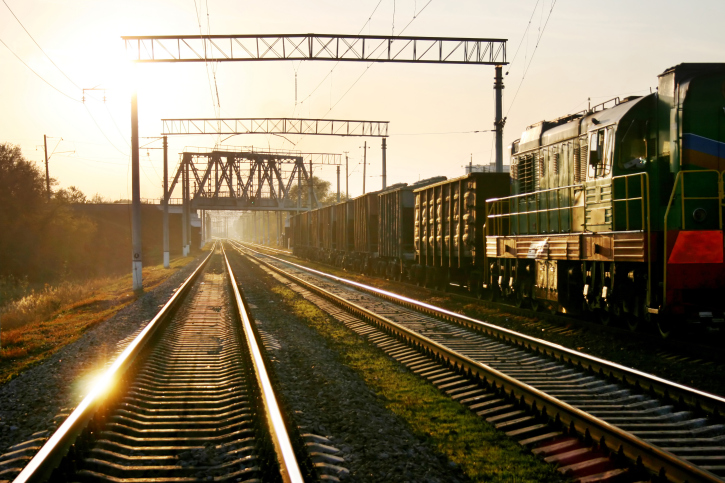
After CSX Corp. (NYSE: CSX) reported its first quarter results last night, investors began selling the railroad company’s stock and shares are down about 3% this morning. The company is the first of the U.S. railroads to report earnings this quarter and we want to
see what the other railroaders have in store.
It’s well-known by now that coal shipments have tumbled at all major rail carriers as natural gas has replaced coal at many electricity-generating plants. In its most recent report on U.S. rail traffic, the American Association of Railroads notes that coal shipments were down 7.3% year-over-year for the year to date, although coal shipments rose 1.7% compared with the same week a year ago. (Higher natural gas prices are the likely cause of the increase.)
Shipments of petroleum and petroleum products are nearly 57% higher year-to-date than they were a year ago and about 53% higher than the total for the same week a year ago. But coal accounts for nearly 9 times more traffic than petroleum, so while the increase is welcome, petroleum shipments can’t close the revenue gap.
The best-placed railroad to take advantage of the increased shipments of petroleum by rail is Burlington Northern Santa Fe, which is owned by Warren Buffett’s Berkshire Hathaway Inc. (NYSE: BRK-A). The BNSF hauled about 240,000 barrels a day of crude in 2012, up from just 3,500 barrels a day in 2008, the year before Buffett paid $34 billion for the railroad. BNSF expects petroleum traffic to rise by 40% again in 2013.
Other rail carriers include Union Pacific Corp. (NYSE: UNP), Canadian Pacific Railway Ltd. (NYSE: CP), Canadian National Railway Ltd. (NYSE: CNI), Norfolk Southern Corp. (NYSE: NSC), and Kansas City Southern (NYSE: KSU).
Burlington Northern’s revenues and earnings will be reported with Berkshire Hathaway’s later this quarter. But last year, BNSF posted revenues of more than $20 billion, up from $14 billion in 2009, the year before Berkshire Hathaway took over. Analysts expect Berkshire Hathaway to post earnings per share (EPS) of $1.24 in the first quarter.
Canadian National Railway Ltd. (NYSE: CNI) is expected to post revenue of $2.49 billion and EPS of $1.22, an increase of just 3% over the same period a year ago. The company is the second-largest carrier of petroleum, with 21% of the market, trailing only BNSF’s 40% share. Canadian National executives think the carrier may double its carloads of petroleum in 2013 compared with last year.
Union Pacific Corp. (NYSE: UNP) is expected to post revenue of $5.22 billion and EPS of $1.96 for the first quarter, an increase of 9.5% over the same period a year ago. The company reports earnings tomorrow. Petroleum shipments rose 69% year-over-year in 2012, helping to offset a 14% drop in coal shipments. Union Pacific handles about 15% of U.S. rail shipments of petroleum.
Canadian Pacific Railway Ltd. (NYSE: CP) is expected to post revenue of $1.48 billion and EPS of $1.21, a whopping 48% increase over the first quarter a year ago. The company is the fourth-largest petroleum carrier, with a 12% market share.
Kansas City Southern (NYSE: KSU) is scheduled to report results on Friday and is expected to post revenue of $571.8 million and EPS of $0.88, a 17% increase over the same period a year ago. The company is getting a boost from a new automobile import terminal in Mexico.
Norfolk Southern Corp. (NYSE: NSC) is expected to post revenue of $2.77 billion and EPS of $1.17, an decrease of nearly 5% compared with last year. The company reports earnings next week. The company has not been able to beef up its traffic to offset the drop in coal shipments.
CSX, Kansas City Southern, and Norfolk Southern capture only about 4% of petroleum shipments by rail. CSX has been able to replace some of its lost coal shipments with intermodal (container) shipments and other merchandise shipments.
Although rail transportation is far costlier than pipeline transportation, oil producers and refiners do not have to sign long-term contracts to ship their products to market. Another advantage that railroads hold is that they go just about everywhere, including places that pipelines do not reach. It could be that rail transportation may permanently cut into the pipeline business even if major pipelines like the Keystone XL are eventually built.
Are You Ahead, or Behind on Retirement? (sponsor)
If you’re one of the over 4 Million Americans set to retire this year, you may want to pay attention.
Finding a financial advisor who puts your interest first can be the difference between a rich retirement and barely getting by, and today it’s easier than ever. SmartAsset’s free tool matches you with up to three fiduciary financial advisors that serve your area in minutes. Each advisor has been carefully vetted, and must act in your best interests. Start your search now.
Don’t waste another minute; get started right here and help your retirement dreams become a retirement reality.
Thank you for reading! Have some feedback for us?
Contact the 24/7 Wall St. editorial team.




